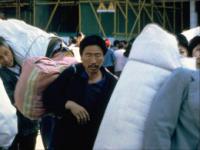
The global economic downturn is having an adverse effect on migrants as they are excluded from stimulus packages and AIDS programmes are threatened, concludes a UN report released at ICAAP 09. Credit: UNAIDS/O.O'Hanlon
The global economic downturn is having an adverse effect on migrants as they are excluded from stimulus packages and AIDS programmes are threatened, concludes a UN report released at the 9th International Congress on AIDS in Asia and Pacific (ICAAP). As in the 1997 Asian crisis, negative impacts on health and migration are set to become graver as donor funding and government programmes are cut.
Entitled The threat posed by the economic crisis to Universal Access to HIV services for migrants, the report is issued by the UN Development Programme (UNDP), the International Labour Organization (ILO) and the Joint United Nations Programme on HIV/AIDS (UNAIDS). It draws parallels between the current crisis and that of the Asian downturn of 1997 when the economies of Hong Kong, Indonesia, Japan, Korea, Malaysia, Singapore and Thailand were engulfed in turmoil after the collapse of Thailand’s stock market. The report argues that trends in migration policies and AIDS programmes now mirror those of 1997; a worrying development.
“It is critical that policy makers don’t make the same decisions that were made in ’97 vis-à-vis cuts to essential HIV/AIDS programmes, and adverse policies that worked against migrant workers. In contrast to the massive stimulus packages that countries are launching to boost their economies, AIDS spending for a comprehensive response represents a mere 0.01% of such programmes”, says Caitlin Wiesen, UNDP Regional HIV Practice Team Leader for Asia and the Pacific.
According to JVR Prasada Rao, Director of UNAIDS Regional Support Team, Asia and the Pacific, “Even before the financial crisis, HIV programmes and services for migrants and mobile populations often fell through the cracks in national programmes. Besides, we had seen from the past financial crisis that HIV prevention programmes were first to face budget cutbacks. Issues related to migrants are critical in a region with fast economic growth like Asia. We must strongly advocate with governments and donors not to cut resources on migrant HIV programmes.”
In the face of crisis, countries often introduce policies to cut migration, such as deporting workers or making migrant work permits more difficult to obtain. The 1997 downturn showed that this simply does not work. Instead, denied formal avenues for migration, many people find back door, unsafe channels that often make them vulnerable to HIV. According to the paper, governments have stopped issuing work permits, are cracking down on undocumented migrants (Malaysia) and many foreign workers in manufacturing and construction are being laid off (Indonesia, China). In a number of countries there are increasing reports of worsening working conditions (in Hong Kong, Malaysia and Singapore).
“In times of economic downturn, we cannot forget the needs and rights of migrant workers who are such an integral part of so many economies, especially in our region” says Dhannan Sunoto of the ASEAN Secretariat. “It is critical to ensure that potential migrants are not barred from working abroad based on their HIV positive status, and that migrants working abroad are not deported because of their positive status.”
As Dr Sophia Kisting, Director of the ILO Programme on HIV/AIDS and the world of work has it, “In the context of the current economic crisis we have reports of increased human rights violations, and pressure on migrant workers to move from formal to informal employment or to return to their countries of origin. These trends are likely to exacerbate vulnerability to HIV.”
She adds that her organization is moving forward with urgency in this area. “The ILO is in the process of formulating an international human rights instrument on HIV/AIDS and the world of work. If adopted in 2010, this standard…will give new impetus to anti-discrimination policies at national and workplace levels.”
The report outlines key recommendations:
- Establish protective mechanisms like welfare funds, social insurance schemes and training programmes to help migrants returning home or to relocate on site;
- Translate regional and national strategies for HIV that include migrants and mobile populations into budgets and services that are designed to reach people on the move;
- Maintain prevention programmes and budgets: every $1 invested in prevention can save up to $8 in averted treatment costs;
- Support civil society organizations to monitor the health-seeking behaviour of migrants so they do not have to sacrifice treatment for other basic necessities.
The paper was released at the symposium, The impact of the financial crisis on labour migration and HIV, organized by UNDP, ILO, UNAIDS and JUNIMA.



